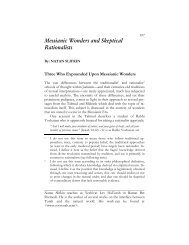Is There a Disconnect between Torah Learning and ... - Hakirah.org
Is There a Disconnect between Torah Learning and ... - Hakirah.org
Is There a Disconnect between Torah Learning and ... - Hakirah.org
Create successful ePaper yourself
Turn your PDF publications into a flip-book with our unique Google optimized e-Paper software.
<strong>Is</strong> there a <strong>Disconnect</strong> <strong>between</strong> <strong>Torah</strong> <strong>Learning</strong> <strong>and</strong> <strong>Torah</strong> Living? : 27<br />
habit becomes second nature. This is after all, the foundation of<br />
education programs, of :חינוך the belief that man can harness <strong>and</strong><br />
train his nature. This belief is supported by a wide body of research<br />
that shows “that our actions influence our thoughts.” 22 Thus, we<br />
must insist that our children engage in behaviors <strong>and</strong> actions that<br />
reflect concern <strong>and</strong> respect for others, so that such concerns<br />
become embedded in their very natures.<br />
We must not begin with lofty speeches <strong>and</strong> fancy programs.<br />
Instead, we must begin with the most mundane <strong>and</strong> simple parts of<br />
their daily experience <strong>and</strong> behavior. We must teach our children what<br />
to do, i.e., how to behave.<br />
At home, we must teach them at an early age to pick up their toys<br />
<strong>and</strong> put them away. Not only because they should not leave a mess,<br />
but more important, that they not grow up thinking that it is the duty<br />
of others (i.e., their mother) to serve them, <strong>and</strong> that they be<br />
conscious of not making work for others.<br />
Similarly, children, <strong>and</strong> especially the boys, must learn to clean off<br />
the table after they have eaten—at the very least, to place their dirty<br />
dishes in the sink, not to leave their own dirty plates for others to<br />
take off the table. They should feel embarrassed when they fail to do<br />
so. Boys need to learn that neither their mothers nor their sisters are<br />
there to serve them h<strong>and</strong>-<strong>and</strong>-foot. I have seen the unfortunate<br />
results in the development of boys who have not learned this basic<br />
,נשים צדקניות sensitivity. Their well-meaning mothers <strong>and</strong> sisters, true<br />
wishing to show respect to <strong>Torah</strong>, have inadvertently taught them to<br />
expect other to do their work. They have been told that all they<br />
needed to do was learn. They believed it, <strong>and</strong> they learned. But when<br />
כי האדם נפעל כפי פעולותיו where he writes ספר החינוך in the "ז מצוה ט 22 See<br />
This .ולבו וכל מחשבותיו תמיד אחר מעשיו שהוא עוסק בהם אם טוב ואם רע<br />
truth, which at one time was dismissed by the moderns, has by now<br />
been corroborated by research <strong>and</strong> is recognized so much that one of<br />
the leading Introductory Psychology textbooks writes, “Many streams<br />
of research confirm that attitudes follow behavior.” (Myers, David G.,<br />
Psychology, 8 th Ed., 2007, Worth Publishers, p. 726.) Even popular<br />
culture has now recognized this. See Brooks, David in a recent New<br />
York Times Op-Ed piece, “Pitching with a Purpose.” He cites from<br />
“The Mental ABC’s of Pitching,” a book on baseball, <strong>and</strong> writes,<br />
“Behavior shapes thought. If a player disciplines his behavior he will<br />
also discipline his mind.” N.Y Times, April 1, 2008.
















